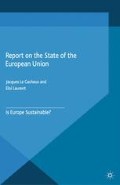Abstract
While the EU has been a driving force for the expansion of civil liberties, political rights and human rights, making Europe the most democratic continent in the world, democracy is in crisis within nation states because of the very nature of European integration that structurally relies more on output than input democracy (discussed below). The European crisis of efficiency in the course of and the aftermath of the “great recession” has logically turned into a crisis of trust with respect to the European project itself that must be fixed if Europeans want to curb the rise of anti-EU populism.
Access this chapter
Tax calculation will be finalised at checkout
Purchases are for personal use only
Preview
Unable to display preview. Download preview PDF.
References
Brennan, G. and Buchanan, J.M. (1988) The Reason of Rules — Constitutional Political Economy. New York: Cambridge University Press.
CEPR . (2009) “Euro Area Business Cycle Dating Committee: Determination of the 2008 Q1 Peak in Economic Activity”, March 2009, http://www.cepr.org/PRESS/Dating-Committee-Findings-31-March-2009.pdf.
Kydland, F.E. and Prescott, E.C. (1977) “Rules Rather Than Discretion: The Inconsistency of Optimal Plans”. Journal of Political Economy 85: 473–491.
Laurent, É. (2010) “If It’s Broken, Don’t Fix It: The Government of the Euro Area in the EU Reform Treaty” in Fitoussi, J.-P. and Le Cacheux, J. (eds) Report on the State of the European Union, Crisis in the EU Economic Governance , vol. 3, London: Palgrave Macmillan.
Laurent, É. and Le Cacheux, J. (2006) “Integrity and Efficiency in the EU: The case against the European Economic Constitution” (with), Working Paper Series No 130, Center for European Studies, Harvard University, March.
Majone, G. (1996) Regulating Europe . London: Routledge.
Majone, G. (2005) “Delegation of Powers and the Fiduciary Principle”. Paper presented at the CONNEX Workshop “Delegation and Multi-Level Governance”. Paris, May 11.
Moravcsik, A. (2002) “In Defence of the Democratic Deficit: Reassessing Legitimacy in the European Union”. Journal of Common Market Studies (40th Anniversary Edition) 40: 603–624.
NBER. “Business Cycle Dating Committee, National Bureau of Economic Research”, December 2008, http://www.nber.org/cycles/dec2008.html.
Polavieja, J.G. (2013) “Economic Crisis, Political Legitimacy and Social Cohesion” in Gallie, D. (ed.) Economic Crisis, Quality of Work and Social Integration: The European Experience ,Oxford: Oxford University Press.
Scharpf, F. (1999) Governing in Europe: Effective and Democratic? Oxford: Oxford University Press.
Scharpf, F. (2002) “The European Social Model-Coping with the Challenges of Diversity”. Journal of Common Market Studies (40th Anniversary Edition) 40: 645–670.
Siedentop, L. (2002) Democracy in Europe . New York: Columbia University Press.
Wessels, W. (1997) “An Ever Closer Fusion? A Dynamic Macropolitical View on Integration Processes”. Journal of Common Market Studies 35 (2): 267–299.
Author information
Authors and Affiliations
Copyright information
© 2015 Jacques Le Cacheux and Eloi Laurent
About this chapter
Cite this chapter
Le Cacheux, J., Laurent, E. (2015). The Democratic Paradox of the EU. In: Report on the State of the European Union. Palgrave Macmillan, London. https://doi.org/10.1057/9781137451088_2
Download citation
DOI: https://doi.org/10.1057/9781137451088_2
Publisher Name: Palgrave Macmillan, London
Print ISBN: 978-1-349-49719-5
Online ISBN: 978-1-137-45108-8
eBook Packages: Palgrave Economics & Finance CollectionEconomics and Finance (R0)

